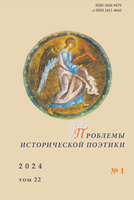Функции этикета в поэтике романа Ф. М. Достоевского «Бесы»
Functions of Etiquette in the Poetics of F. M. Dostoevsky’s Novel “Demons”
Author(s): Valentina Nikolayevna StepchenkovaSubject(s): Russian Literature, Theory of Literature, Sociology of Literature
Published by: Петрозаводский государственный университет
Keywords: Dostoevsky; novel Demons; poetics; ethics; etiquette; culture; image; character; dialogue; society; axiology; value paradigm; folklore; epic;
Summary/Abstract: The article clarifies the value function of etiquette in the novel “Demons,” identifies communicative situations in which observance of etiquette or, conversely, departure from generally accepted norms of behavior affects the characters and beliefs of the characters. Noble, folk and folk-poetic (epic, fairy-tale) etiquette are considered. Various forms of his expression are analyzed — through the character’s speech, gestures, facial expressions, actions. The importance of moral attitudes that determine the ethics and the inner world of a person is demonstrated, reflecting to a greater extent in the external way of acting and relationships than the knowledge of the secular manners and communication culture. Despite the decent manners noted by the chronicler, Pyotr Verkhovensky regularly wanted to offend and insult his interlocutors; Stepan Trofimovich’s external untidiness appears along with his bad habits and inclinations; Verkhovensky’s “five” created a special behavioral narrative demonstrating their views and immoral appearance; the degraded and slovenly Lebyadkin begins to jauntily observe the etiquette when he sees a personal benefit in it. The different styles of the characters’ etiquette behavior allowed to identify a peculiar typology of heroes, in which, on the one side are the characters with elegant manners, but without a moral core, occupy diametric positions, on the other hand — heroes who are far removed from refined education, but not devoid of moral principles and virtues. Dostoevsky shows various functions of etiquette, many of which turned out to be a manifestation of the lack of the characters’ spirituality and served as a means to achieve their selfish goals. In addition to secular etiquette, elements of national consciousness are introduced into the poetics of the work. At its core are the Orthodox faith and love for Christ, which was a genuine ethical guideline for Dostoevsky. The convergence of the noble world with the folk world formed new value concepts of the novel’s characters, which was implemented in external behavior. The inclusion of folk culture in the cultural context introduced into the work complementary religious and ethical meanings inseparable from goodness and truth, which were significant for Dostoevsky.
Journal: Проблемы исторической поэтики
- Issue Year: 22/2024
- Issue No: 1
- Page Range: 139-156
- Page Count: 18
- Language: Russian

